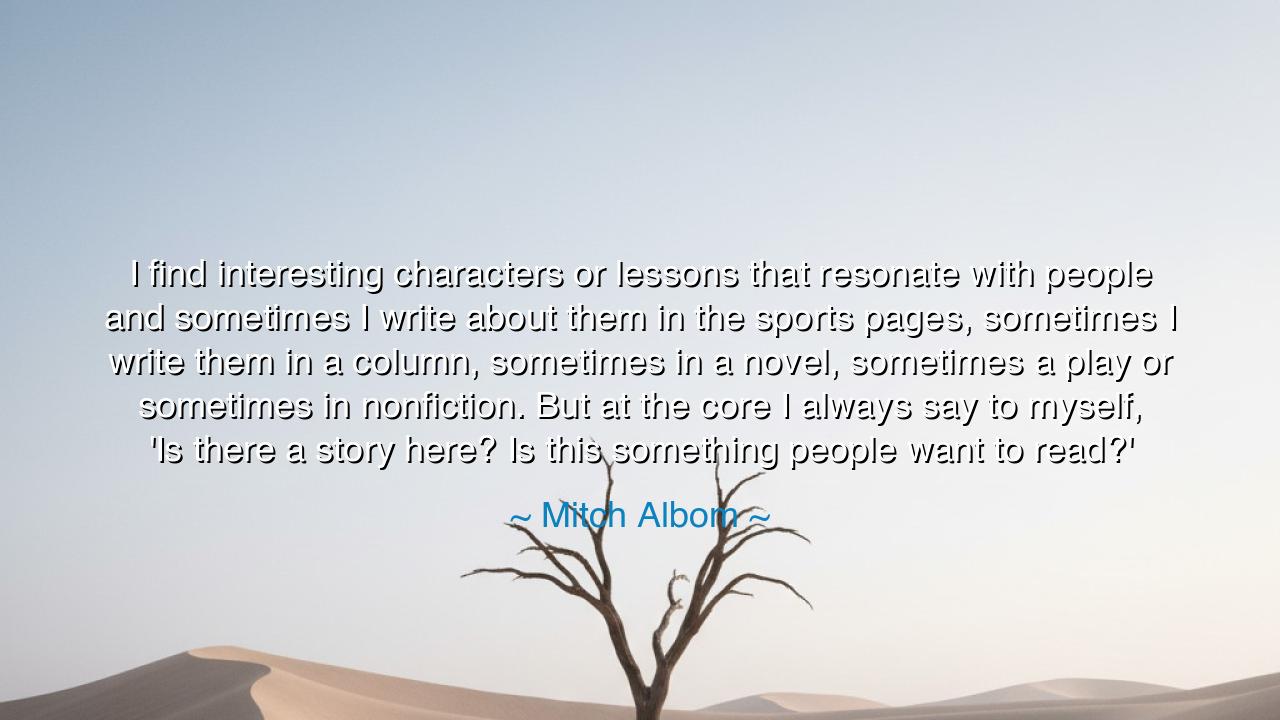
I find interesting characters or lessons that resonate with
I find interesting characters or lessons that resonate with people and sometimes I write about them in the sports pages, sometimes I write them in a column, sometimes in a novel, sometimes a play or sometimes in nonfiction. But at the core I always say to myself, 'Is there a story here? Is this something people want to read?'






The words of Mitch Albom are both humble and profound: “I find interesting characters or lessons that resonate with people and sometimes I write about them in the sports pages, sometimes I write them in a column, sometimes in a novel, sometimes a play or sometimes in nonfiction. But at the core I always say to myself, ‘Is there a story here? Is this something people want to read?’” These words reveal the sacred calling of the storyteller — not to confine himself to one form, nor to speak for his own glory, but to serve the deeper hunger of humanity: the hunger for stories that resonate.
The meaning here is clear: every form of writing, whether in journalism, fiction, or drama, is but a vessel. What matters most is the heart of the tale, the lesson hidden in the life of a character, the truth shining through a moment. Albom reminds us that the essence of art is not the shape of its container but the spirit it carries. He asks the eternal question: “Is there a story here?” For if there is no story, there is no bridge between writer and reader, no spark to kindle the soul.
The origin of Albom’s insight is found in his own journey. He began as a sportswriter, covering games and athletes. Yet within those arenas he found not only scores, but human drama — courage in the face of defeat, sacrifice for the sake of a team, resilience against injury and despair. From there he grew into novels like Tuesdays with Morrie and The Five People You Meet in Heaven, works that touched the deepest parts of the human spirit. His words remind us that whether one writes of sports or eternity, the task is the same: to uncover meaning in the lives of others and to share it in a way that awakens the heart.
History offers examples of this truth. Consider Herodotus, who called himself “the inquirer,” gathering stories from across nations not to glorify himself, but to preserve lessons for future generations. Or Shakespeare, who transformed history, comedy, and tragedy into plays that still speak to the soul centuries later. Neither was bound by form; both were bound by the deeper question Albom himself asks: is there a story here worth telling? And if so, will it speak to the people who hear it?
There is also wisdom here about humility. Many writers and speakers are tempted to impress with cleverness, but Albom reminds us that the true test is not the ego of the writer but the need of the reader. What people want is not vanity, but resonance, not ornament, but truth clothed in words. A story matters not because it is written, but because it is remembered, carried in the heart, whispered again from one generation to the next.
The lesson for us is this: in whatever we do — whether we write, speak, teach, or live — we must seek the story. We must ask, “Does this matter? Will this resonate? Will it leave someone changed?” For every life, even the quietest, holds a tale that can awaken others. To live with awareness is to live as both seeker and teller of stories, shaping meaning from the fabric of existence.
So let us walk with Albom’s words engraved upon our hearts. In your work, in your friendships, in your family, ask: what is the story here? When you encounter courage, honor it. When you witness sacrifice, remember it. When you see beauty, share it. For the world is not moved by facts alone, but by stories — the eternal vessels of human truth. And if we, like Albom, dedicate ourselves to finding and telling them, then our lives too will resonate, leaving behind not silence, but a chorus of meaning for generations yet to come.






AAdministratorAdministrator
Welcome, honored guests. Please leave a comment, we will respond soon